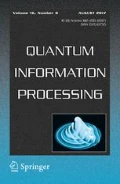Abstract
One of the early achievements of quantum computing was demonstrated by Deutsch and Jozsa (Proc R Soc Lond A Math Phys Sci 439(1907):553, 1992) regarding classification of a particular type of Boolean functions. Their solution demonstrated an exponential speedup compared to classical approaches to the same problem; however, their solution was the only known quantum algorithm for that specific problem so far. This paper demonstrates another quantum algorithm for the same problem, with the same exponential advantage compared to classical algorithms. The novelty of this algorithm is the use of quantum amplitude amplification, a technique that is the key component of another celebrated quantum algorithm developed by Grover (Proceedings of the twenty-eighth annual ACM symposium on theory of computing, ACM Press, New York, 1996). A lower bound for randomized (classical) algorithms is also presented which establishes a sound gap between the effectiveness of our quantum algorithm and that of any randomized algorithm with similar efficiency.

References
Grover, L.K.: A fast quantum mechanical algorithm for database search. In:Proceedings of the Twenty-Eighth Annual ACM Symposium on Theory of Computing, pp.212–219. ACM Press, New York (1996). doi:10.1145/237814.237866
Shor, P.W.: Polynomial-time algorithms for prime factorization and discrete logarithms on a quantum computer. SIAM J. Comput. 26(5), 1484 (1997). doi:10.1137/S0097539795293172
Jordan, S.: Quantum Algorithm Zoo. http://math.nist.gov/quantum/zoo/
Deutsch, D.: Quantum theory, the Church-Turing principle and the universal quantum computer. Proc. R. Soc. A Math. Phys. Eng. Sci. 400(1818), 97 (1985). doi:10.1098/rspa.1985.0070
Deutsch, D., Jozsa, R.: Rapid solution of problems by quantum computation. Proc. R. Soc. A Math. Phys. Eng. Sci. 439(1907), 553 (1992). doi:10.1098/rspa.1992.0167
Brassard, G., Høyer, P.: An exact quantum polynomial-time algorithm for Simon’s problem. In: Proceedings of the Fifth Israeli Symposium on Theory of Computing and Systems. IEEE Computing Society (1997), pp. 12–23. doi:10.1109/ISTCS.1997.595153
Grover, L.: Quantum computers can search rapidly by using almost any transformation. Phys. Rev. Lett. 80(19), 4329 (1998). doi:10.1103/PhysRevLett.80.4329
Nielsen, M.A., Chuang, I.L.: Quantum Computation and Quantum Information (Cambridge Series on Information and the Natural Sciences), 1st edn. Cambridge University Press, (2004). doi:10.1017/CBO9780511976667
Cleve, R., Ekert, A., Macchiavello, C., Mosca, M.: Quantum algorithms revisited. Proc. R. Soc. A Math. Phys. Eng. Sci. 454(1969), 339 (1998). doi:10.1098/rspa.1998.0164
Brassard, G., Hoyer, P., Mosca, M., Tapp, A.: Quantum amplitude amplification and estimation. In Quantum Computation and Quantum Information: A Millennium Volume, AMS Contemporary Mathematics Series, vol. 305. American Mathematical Society (2002) doi:10.1090/conm/305
Author information
Authors and Affiliations
Corresponding author
Rights and permissions
About this article
Cite this article
Bera, D. A different Deutsch–Jozsa. Quantum Inf Process 14, 1777–1785 (2015). https://doi.org/10.1007/s11128-015-0976-2
Received:
Accepted:
Published:
Issue Date:
DOI: https://doi.org/10.1007/s11128-015-0976-2

